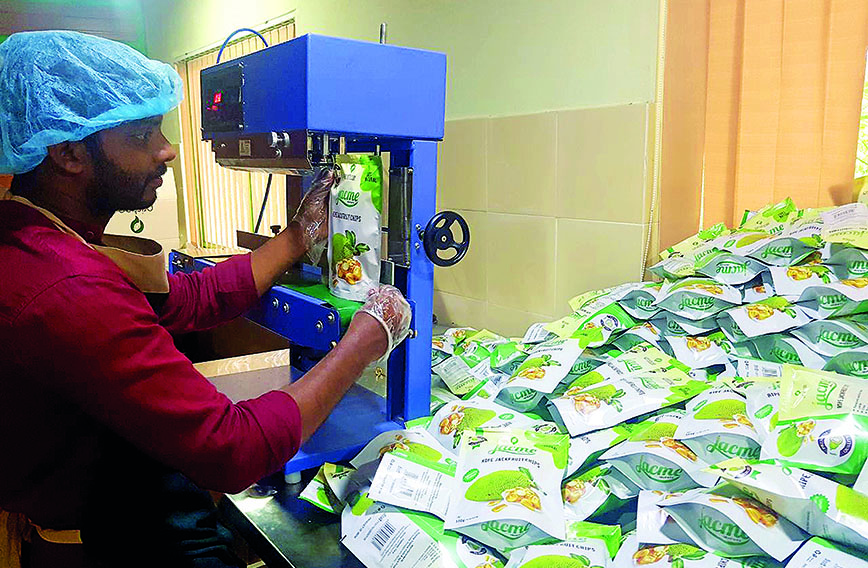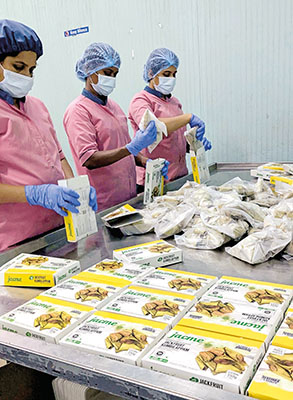
Rony with his father, Tom Kavalackal
Jack the Vietnam way
Shree Padre, Kasaragod
ABOUT a decade ago Tom C. Kavalackal, a well-to-do Keralite, made a trip to Vietnam. Quite by chance, he was served jackfruit chips — a snack he’d never eaten before. Impressed with the crunch and flavour of the chips, he wondered whether such an awesome product could be made from local jackfruit back home.
Determined to give it a try, he returned to his village, Kappil, in Malappuram district of Kerala and started Pristine Tropical Fruits in 2018. Within a few months, his factory began producing vacuum fried jackfruit chips. Until then, chips made from ripe jackfruit were almost unknown in the market.
Kavalackal is now 65 years old. His son, Rony, runs the business which has made a name for itself in jackfruit processing. The company had to initially invest substantially in R&D to be able to manufacture jackfruit chips throughout the year.
After overcoming setbacks due to Covid and floods, Pristine set its sights on the export market. It soon realized it would have to master the ability to produce a series of frozen jackfruit products. The company started with packed frozen tender jackfruit and went on to create traditional jackfruit preparations and semi-processed jackfruit.
Pristine now exports 15 jackfruit products under its brand name, Jacme, to a dozen countries. Five products are semi-processed — ripe jackfruit, green jackfruit, sliced green jackfruit, tender jackfruit and sliced jackfruit seeds.
 |
| Jackfruit chips being packed and readied for sale |
The other 10 are typical traditional preparations like Chakka Varatty, Chakka Ada, Kumbiliyappam, jackfruit halwa, and jackfruit Elayada from ripe jackfruit. Their most inventive products are vacuum fried jackfruit chips and jackfruit cake from ripe jackfruit. Chakka Puzukku with tender mango pickle and mango curry has green jackfruit as its main raw material. Idichakka thoran, made with tender jackfruit, is a stir-fry dish.
Pristine exports to the US, UK, Ireland, New Zealand, Canada, Australia, Qatar and other countries. Frozen products like tender jackfruit, frozen green jackfruit and frozen sliced green jackfruit are sold in the Gulf countries by the Lulu hypermarket group under its brand name. Pristine has dedicated distributors in the countries it exports to. Frozen ripe jackfruit has a shelf life of a year.
“About 80 percent of our customers are Keralites living in the countries we export to. But we also have customers who belong to the Philippines and Sri Lanka. Tamilians too are buyers,” says Kavalackal. “Demand is steadily rising.”
Export of frozen jackfruit and other value-added products goes back two decades, pioneered by Parayil Exports of Kottayam district. More than 10 companies in Kerala are now exporting sliced green jackfruit. According to guesstimates around 1,000 tonnes are sent out of the country. Interestingly, Kerala is the only state that exports sliced green jackfruit.
But Pristine has caught up with the early birds in the business. It exports about 100 tonnes of sliced green jackfruit which is cooked as a vegetable and seems to have the biggest demand. Chakka Puzukku, which can be made into a staple food or converted into chips, is also popular.
“We have many Chakka Puzukku aficionados in Texas. They are early settlers who migrated from the Travancore area. It’s mainly the elderly generation that is very fond of it,” says Kavalackal.
In Travancore, Chakka Puzukku retains its popularity amongst the Christian community. “It is an evening snack relished with tender mango pickle,” says Kavalackal. “We export the same combination.”
Another 300 tonnes of sliced green jackfruit, green jackfruit bulbs and tender jackfruit are also exported. “But frozen sliced raw jackfruit doesn’t have a market in Kerala. We did introduce it in some supermarkets in Ernakulam but it didn’t click at all,” he says.
So, his company hasn’t placed its frozen jackfruit products on supermarket shelves in Kerala or anywhere else in India.
After experimenting with freezing many jackfruit varieties, Pristine zeroed in on the Vietnam Early variety. They found it best suited for freezing. “Its flakes are very firm,” says Kavalackal. “To ensure a dedicated supply we took 30 acres on lease and planted 6,000 trees which are now two years old. They will start yielding fruit from next year.”
 |
| The company makes jackfruit kumbiliyappam too |
Most of their tender jackfruit is sourced from Idukki and Wayanad districts. The season is from January to February in Wayanad. In the Thiruvananthapuram-Neyyattinkara area, jackfruit is available from November to December.
During the season, Pristine collection centres buy about two tonnes of jackfruit daily. It is cleaned, cut and blast frozen in the cold room.
The jackfruit off-season is from August to November. To meet its requirements, Pristine has started sourcing frozen jackfruit from an Idukki company from whom they bought 20 tonnes this year.
A frequent visitor to Vietnam, Kavalackal has picked up important lessons from there. He noted that each jackfruit factory which made vacuum fried chips, their main product, had links to pre-processing centres. “People arrive at their collection centres with peeled jackfruit flakes. About two to five tonnes per day is bought, blast frozen and stored in a cold room. It is supplied to industries according to their requirement or exported to other countries. China is a major buyer,” says Kavalackal.
Taking a leaf out of Vietnam’s book, Kavalackal’s company freezes ripe jackfruit in its cold room. This helps tide over shortages during the off-season.
Pristine went the extra mile to realize its dream of being a leading jackfruit processor. The company arranged to buy ripe fruits from a faraway centre in Pala in Kottayam district. The peeled flakes were blast frozen there by another company. Frozen jackfruit blocks were transported in reefer trucks to a friend’s cold room in Palakkad. From there the frozen fruit was brought to Kappil village in Malappuram, as and when required, to produce vacuum fried chips. To ensure efficient and timely transport, the company hired a reefer truck on a monthly basis.
Today, Pristine has all these facilities at its headquarters. The company has three blast freezers, three cold rooms with a combined capacity of 200 tonnes, and three reefer trucks. Such sophisticated infrastructure has been built for the first time in India’s jackfruit industry.
Cutting and peeling jackfruit bulbs is the toughest job in jackfruit processing. Peeling is a cumbersome job since it is done manually. One person’s output is only 20 to 25 kg of flakes per day. Women staffers are paid a daily wage of Rs 400.
For efficiency and better output, Pristine outsources the work of jackfruit peeling. It buys peeled jackfruits from the neighbourhood, paying Rs 100 per kg during the off-season and Rs 70 during the peak season. If the flakes are sliced, the company pays an extra Rs 10 per kg.
Scientists say that single-variety plantations are required for the jackfruit industry to prosper in India. This will ensure heterogeneity of sweetness, colour, flake size and thickness.
Kavalackal’s view differs. He says it is only jackfruit chips which require homogeneity. “Since we grade the jackfruit flakes, we are able to solve the problem of heterogeneity. Small, uneven flakes are diverted for making halwa, varatty, ada and kumbiliyappam,” he explains.
Pristine’s professional, nimble and quick-to-learn attitude has helped it make a name for itself in jackfruit processing. Kavalackal has overcome many challenges to become a leader in jackfruit products, especially the chips that caught his fancy on a visit to Vietnam.
Comments
Currently there are no Comments. Be first to write a comment!



